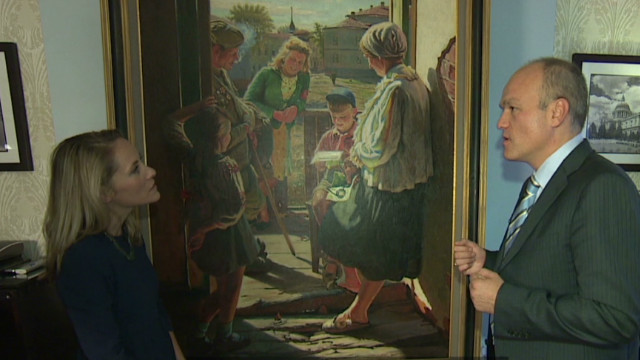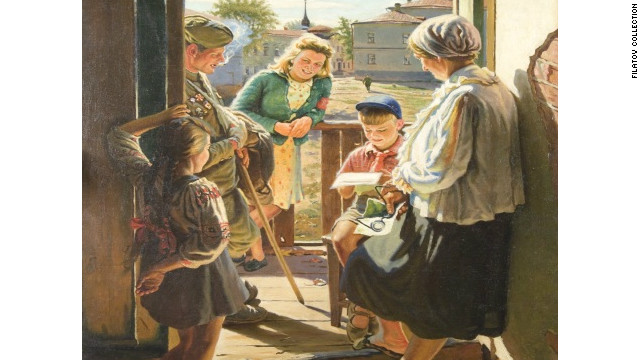
London (CNN) -- Andrei Filatov, chess expert and Russian billionaire, is turning his hand to a new business: Soviet-era art.
Filatov, a 40-year old
professional chess player and businessman, is investing in his love of
Soviet Union art by scouting the world for pieces created behind the
Iron Curtain.
The Ukrainian-born businessman, valued by Forbes at $1.3 billion and
ranked as Russia's 68th richest person, has invested heavily in Russian
infrastructure through his co-ownership of N-Trans Group.
But over the last five
years, he has spent $100 million collecting Soviet artworks, hoping to
gather enough to eventually open a museum.
Filatov's pieces --
including 1951's "A Letter from the Front," by Alexander Laktionov,
1930's "Daisies" by Nicolai Fechin and 1893's "Comrades" by Philip
Maliavin -- have been collected from around the world, where they were
scattered to gather dust after the fall of the Iron Curtain in 1991.
"When the Soviet Union
collapsed, a huge amount of great artworks were taken out of the country
to the west and elsewhere," Filatov says. "My task is to buy these
artworks and show them to people."
 Expand: Art from the Soviet Union
Expand: Art from the Soviet Union
Laktionov is one of the
Soviet Union's most famed painters of the so-called socialist realist
genre, which was sponsored by the state. He was commissioned by the
USSR's communist leader Joseph Stalin to create "A Letter from the
Front," a warm depiction of a family receiving news from the front line.
The original piece,
painted in 1947, won the Stalin Prize and remains in the Tretyakov State
Gallery in Moscow. Filatov's version, painted after Stalin requested a
second version of the artwork to show to the world, was found by chance
in the Bahamas by his art dealer, Rena Lavery.
Despite being critiqued
as propaganda for its warm depictions of life under Stalin's
dictatorship, socialist realism has enjoyed a renaissance as those
living in former Soviet countries seek artifacts from the previous era.
For Filatov, "A Letter
from the Front" reminds him of his grandfather Alexey Pushkar, who died
in 1943 as the Soviets fought the Germans in the bloody battles of the
Eastern Front. He won't reveal how much the artwork cost but says it is
an "emotional painting" that allows him to imagine what it must have
been like waiting for news from loved ones during wartime.
Filatov was a student in
Minsk when the Soviet Union fell and recalls being stunned by the news
that his country didn't exist anymore. It was a "love for the lost
motherland," that prompted him to start collecting the era's art.
Filatov says he is
"aware of what kind of empire I lived in, that many times this empire,
the leaders put the world at risk of world war."
But, he adds, "you can't
not recognize the achievements of the Soviet Union. So I believe that
the most important thing here is an objective view of the achievements,
and the experience of that short and bright empire."
Lavery points to the
technical achievements of the artists in fields such as realism and
impressionism, despite living under a repressive regime. "The artworks
are reflections of the time and that era of a country that doesn't exist
any more," she says.
Filatov wants to collect
up to 12 new artworks a year, primarily from the period 1917 to 1991,
for the Filatov Family Art Fund. He intends to loan the pieces to
museums and art galleries, exhibit and promote around the world. Filatov
has previously merged his love of chess and art by sponsoring this
year's World Chess Championship Match at Moscow's Tretyakov Gallery.
Filatov says he will
continue to invest in art as long as his business -- which he built up
in the 1990s and now straddles shipping, ports and infrastructure --
allows.
And despite his interest
in the past, Filatov says Russians have never "lived more freely or
prosperously than today. Never have our people been so free, not only in
movement but in political choice."
No comments:
Post a Comment